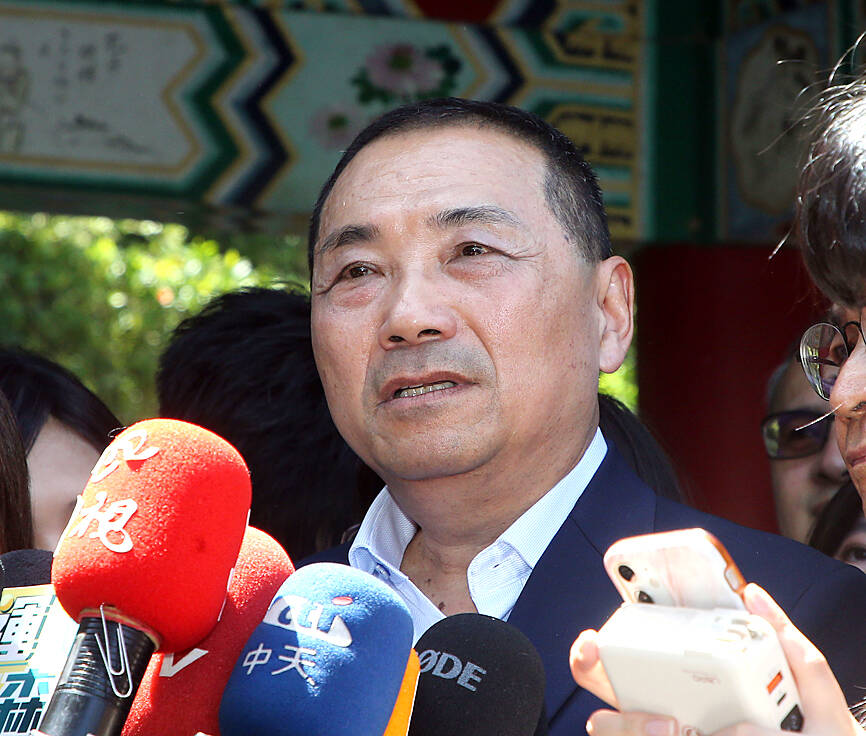New Taipei City Mayor Hou You-yi (侯友宜), who is the Chinese Nationalist Party’s (KMT) presidential candidate, on Monday said he would support a version of the so-called “1992 consensus” that conforms with the Republic of China (ROC) Constitution.
Hou was previously vague about his stance on the “1992 consensus.”
The “1992 consensus” — a term that former Mainland Affairs Council chairman Su Chi (蘇起) in 2006 admitted making up in 2000 — refers to a tacit understanding between the KMT and the Chinese Communist Party that both sides of the Taiwan Strait acknowledge that there is “one China,” with each side having its own interpretation of what “China” means.

Photo: CNA
He said he is against interpreting the “1992 consensus” as referring to “one country, two systems,” as done by the Democratic Progressive Party (DPP) and strongly opposes President Tsai Ing-wen’s (蔡英文) “stigmatization” of it.
Hou did not comment on criticism that he merely echoed the KMT’s long-held position of “one China, different interpretations” — which gives tacit freedom to Taipei and Beijing to come to separate conclusions as to what “China” means. Beijing has never formally endorsed this stance.
The DPP on Tuesday said that Hou’s “consensus” views “flew in the face of mainstream public opinion in Taiwan.”
Referencing a 2019 speech by Chinese President Xi Jinping (習近平), the DPP said that the “1992 consensus” and “one country, two systems” — an arrangement under which China agreed to rule Hong Kong and Macau, and has also proposed for Taiwan — are the same thing.
The speech referred to the “1992 consensus” as a political “foundation” to enable negotiations and exchanges, while “one country, two systems” was characterized as a “policy” and “plan” for achieving “peaceful reunification.”
The DPP has refused to accept the “1992 consensus” on the grounds that Beijing has never acknowledged the ROC’s existence and that agreeing to the “1992 consensus” would imply accepting China’s claim over Taiwan.

Taiwanese can file complaints with the Tourism Administration to report travel agencies if their activities caused termination of a person’s citizenship, Mainland Affairs Council Minister Chiu Chui-cheng (邱垂正) said yesterday, after a podcaster highlighted a case in which a person’s citizenship was canceled for receiving a single-use Chinese passport to enter Russia. The council is aware of incidents in which people who signed up through Chinese travel agencies for tours of Russia were told they could obtain Russian visas and fast-track border clearance, Chiu told reporters on the sidelines of an event in Taipei. However, the travel agencies actually applied

New measures aimed at making Taiwan more attractive to foreign professionals came into effect this month, the National Development Council said yesterday. Among the changes, international students at Taiwanese universities would be able to work in Taiwan without a work permit in the two years after they graduate, explainer materials provided by the council said. In addition, foreign nationals who graduated from one of the world’s top 200 universities within the past five years can also apply for a two-year open work permit. Previously, those graduates would have needed to apply for a work permit using point-based criteria or have a Taiwanese company

The Shilin District Prosecutors’ Office yesterday indicted two Taiwanese and issued a wanted notice for Pete Liu (劉作虎), founder of Shenzhen-based smartphone manufacturer OnePlus Technology Co (萬普拉斯科技), for allegedly contravening the Act Governing Relations Between the People of the Taiwan Area and the Mainland Area (臺灣地區與大陸地區人民關係條例) by poaching 70 engineers in Taiwan. Liu allegedly traveled to Taiwan at the end of 2014 and met with a Taiwanese man surnamed Lin (林) to discuss establishing a mobile software research and development (R&D) team in Taiwan, prosecutors said. Without approval from the government, Lin, following Liu’s instructions, recruited more than 70 software

Taiwanese singer Jay Chou (周杰倫) plans to take to the courts of the Australian Open for the first time as a competitor in the high-stakes 1 Point Slam. The Australian Open yesterday afternoon announced the news on its official Instagram account, welcoming Chou — who celebrates his 47th birthday on Sunday — to the star-studded lineup of the tournament’s signature warm-up event. “From being the King of Mandarin Pop filling stadiums with his music to being Kato from The Green Hornet and now shifting focus to being a dedicated tennis player — welcome @jaychou to the 1 Point Slam and #AusOpen,” the